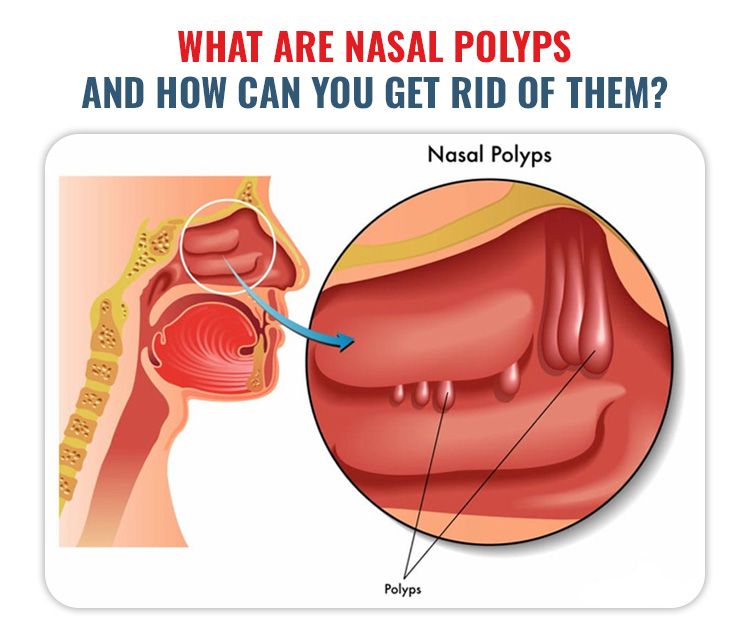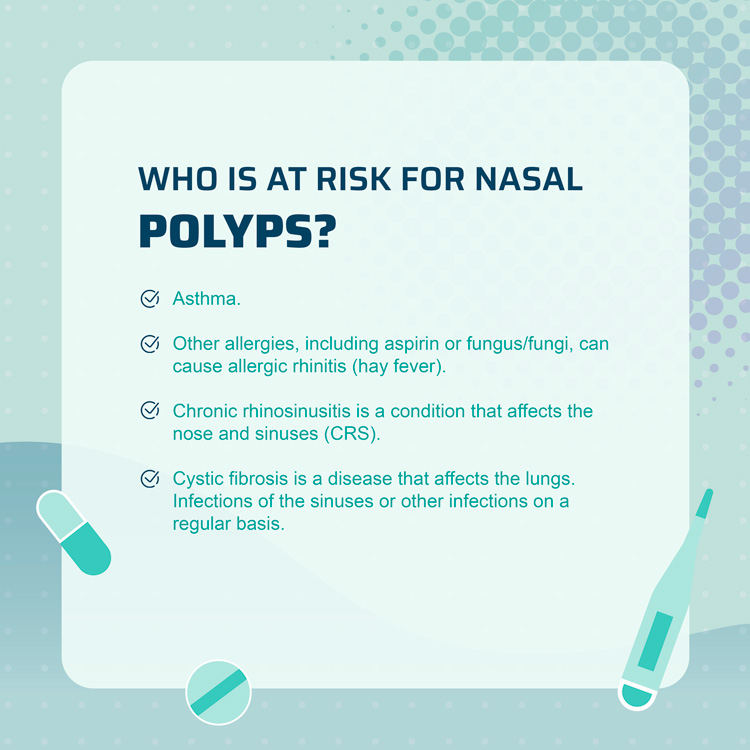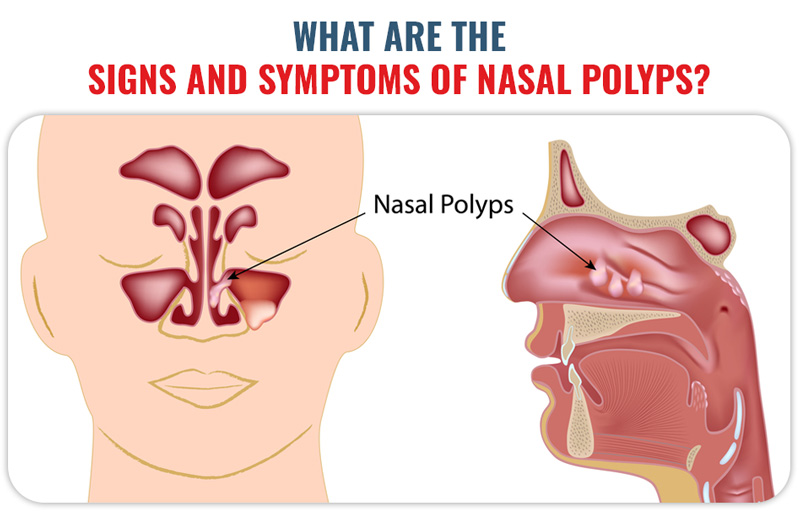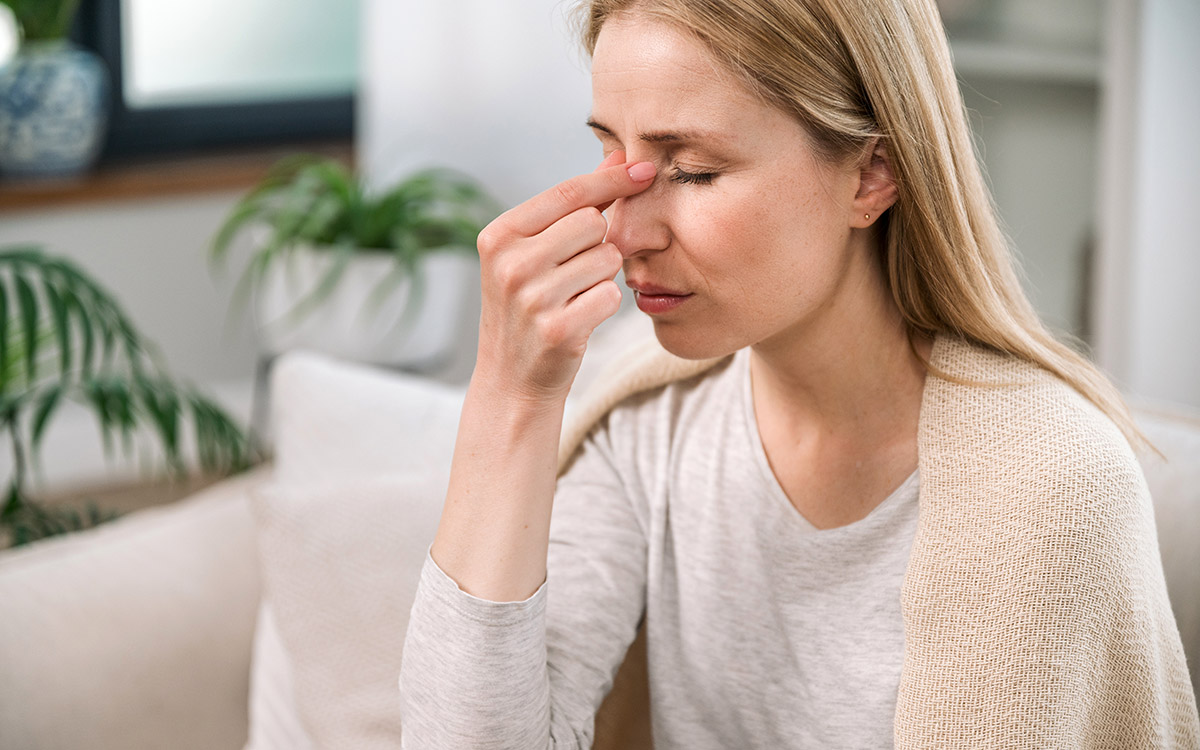Have you ever felt like you have a cold that doesn’t go away? Nasal congestion that doesn’t seem to stop, even with over-the-counter cold or allergy medication, may be due to nasal polyps.
Nasal polyps are soft, painless, noncancerous growths on your nasal passages or sinus lining. They hang down like teardrops or grapes. They result from chronic inflammation and are associated with asthma, recurring infection, allergies, drug sensitivity, or certain immune disorders.
Small nasal polyps may not cause symptoms. Larger growths or groups of nasal polyps can block your nasal passages or lead to breathing problems, a lost sense of smell, and frequent infections.
Nasal polyps can affect anyone, but they’re more common in adults. Medications can often shrink or eliminate nasal polyps, but surgery is sometimes needed to remove them. Even after successful treatment, nasal polyps often return.
How Do You Know If You Have Nasal Polyps?
Nasal polyps are non-painful, soft growths that develop within the nasal passages. They’re most common when your upper sinuses flow into the nose (where your eyes, nose, as well as cheekbones (meet). Because polyps lack nerve sensitivity, you may not be aware that you have them.
Polyps can enlarge to the point that they clog your nasal passages, causing chronic congestion. Among the signs and symptoms are:
- A feeling as if your nose is plugged
- A stuffy nose
- Excess mucus drips into the back of the throat, causing the postnasal drip
- Stuffiness in the nose
- Congestion in the nose
- Decreased olfactory perception
- Breathe via your mouth
- A sense of pressure on the top of your head or in your face
- Apnea (sleep deprivation)
- Snoring
What Are Nasal Polyps, And How Can You Get Rid Of Them?

Nasal polyps are harmless growths that are not malignant. They live in the nasal passages and sinuses, hollow spaces within bones surrounding your nose. Mucous membranes – thin, squishy tissue that lines various body components — give them their shape.
In some cases, nasal polyps can become inflamed and large, obstructing nasal passages and sinuses.
Who Is At Risk For Nasal Polyps?
Nasal polyps usually appear in persons in their 30s or 40s when they are well into adulthood. They’re frequently associated with a nose inflammatory condition, such as:

Read More: Topical Anesthetic Solutions For Laryngoscopy You Should Know
Is It More Common For Nasal Polyps To Appear Solely On A Single Side Or Even Both Edges Of The Nose?
Nasal polyps commonly occur on both sides of the nose. A single-sided growth could be something else entirely, such as a malignant tumor.
What Are The Causes?
Polyps form when the mucous membranes that line the nose and sinuses alter. The membranes become irritated over an extended period of time or repeatedly. Swelling, redness, as well as fluid buildup are all symptoms of inflammation.
According to researchers, inflammation is thought to be caused by allergies and infections. They believe this because they examined tissue from nasal polyps. Extra eosinophils, white cells connected to infections, as well as allergic responses were found in those samples. The evidence indicates too few fluid-filled growths that cause inflammation. Polyps form from these fluid-filled growths.
How Do You Know If You Have Nasal Polyps?
Small polyps may be undetected for a long time. However, when they develop, they can lead to:
- Headaches
- There is a loss of fragrance or taste
- Congestion in the nose (stuffy nose)
- Drainage of the nose (runny nose)
- Nosebleeds
- Postnasal drip
- There is pressure or pain in the sinuses, face, or top teeth
- Snoring
When polyps grow large enough, they can obstruct the nasal passages as well as the sinuses, resulting in the following symptoms:
- People with asthma have a lot of asthma attacks.
- Sinus infections on a regular basis.
- Sleep apnea or even other sleeping problems.
- Breathing problems can happen in persons who do not have asthma.
What Are The Signs And Symptoms Of Nasal Polyps?

Consult a doctor if you’re experiencing symptoms of nasal polyps. A healthcare clinician may use the following methods to diagnose nasal polyps:
- Inquire about your medical history, including any allergies, infections, or asthma.
- Inquire about your problems and also how long you’ve been experiencing them.
- Using a nasal endoscope, look into your nose.
- Order a CT scan to see inside your sinuses in depth.
What Are The Options For Treating Nasal Obstructions?
Although nasal polyps cannot be healed in all people, there are numerous therapies that can help:
- Sprays of steroids to reduce polyps and alleviate discomfort.
- Steroids are used orally (pills you swallow).
- Dupilumab is a drug that is delivered through injections (shots) underneath the skin.
- A small stent is implanted during an outpatient operation (no overnight stay). It props open the nasal airways so that steroids or other drugs can be delivered.
- When alternative therapies fail, outpatient surgery with endoscopy is used to remove polyps.
If you have an illness, your doctor may also prescribe antibiotics.
Surgery For Nasal Polyps
Surgery can remove the polyps if your symptoms aren’t improving. The type of surgery depends on the size of the polyp. A polypectomy is an outpatient surgery done with a small suction device or a microdebrider that cuts and removes soft tissue, including the mucosa.
For larger polyps, your doctor can perform an endoscopic sinus surgery using a thin, flexible endoscope with a tiny camera and small tools on end. Your doctor will guide the endoscope into your nostrils, find the polyps or other obstructions, and remove them. Your doctor may also enlarge the openings to your sinus cavities. This type of surgery is an outpatient procedure most of the time.
After surgery, nasal sprays and saline washes can prevent polyps from returning. In general, reducing the inflammation of the nasal passages with nasal sprays, anti-allergy medications, and saline washes can help prevent nasal polyps from developing.
What Are The Potential Complications Of Nasal Polyps?
Treating nasal polyps, especially with surgery, may result in nosebleeds. Surgery may also result in infection. Continued treatment with nasal steroid sprays or oral corticosteroids may lower your resistance to sinus infections.
What Can I Do To Avoid Nasal Polyps?
Nasal polyps are not preventable for everyone. However, you may do a few things to aid yourself. The following are some of the strategies:
- Take your allergy as well as asthma medications according to your doctor’s instructions.
- Airborne allergies or irritants that cause inflammation of the nose, as well as sinus cavities, should be avoided.
- Maintain a healthy level of hygiene.
- Use a humidifier inside your house to assist moisture in your respiratory passages.
- To remove allergies or even other irritants which may induce nasal polyps, use a saline nasal washing or spray.
Is It Possible For Polyps To Reappear Following Treatment?
Polyps frequently reappear following therapy. Many patients will need to be on steroid medications for an extended period of time or will need to have surgery again.
Read More: Is Hormone Replacement Therapy Beneficial For You?
What Are Some Questions I Should Ask My Doctor Concerning Nasal Polyps?

Consider the following questions for your healthcare provider:
- What can I do to make the symptoms go away?
- Is it necessary for me to take drugs, have surgery, or both?
- Is it necessary for me to limit my activities?
- Is it necessary for me to see a professional?
- Can I go to the hospital if I have any symptoms?
The Bottom Line
When Nasal Polyps grow in the nose or sinuses, they can cause bothersome symptoms and lead to infections. If you’re experiencing new or worsening symptoms, talk to your healthcare provider about medications and short surgeries. These treatments can shrink it and relieve symptoms.
Do you need more information or guidance on how you can benefit from our compounded medicines in cases of it?
King’s Pharmacy and Compounding Center has a combined 30+ years of pharmaceutical experience. We are NABP® Accredited and specialize in customized pharmaceutical compounding for humans and animals. To learn more, visit us!










